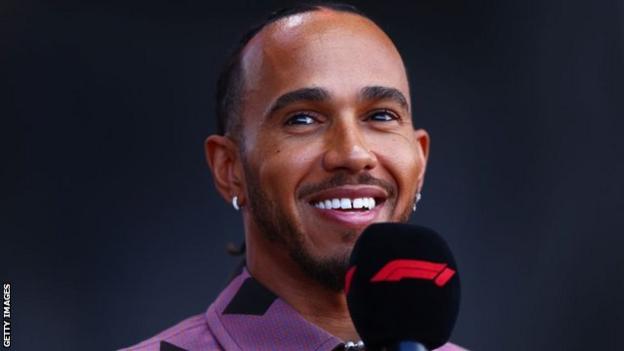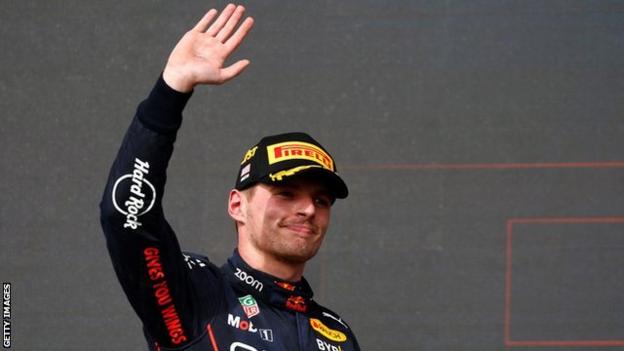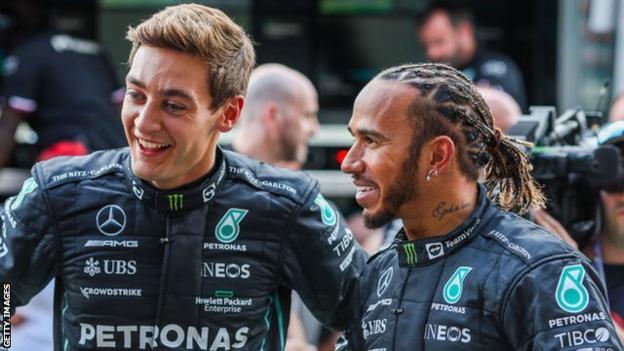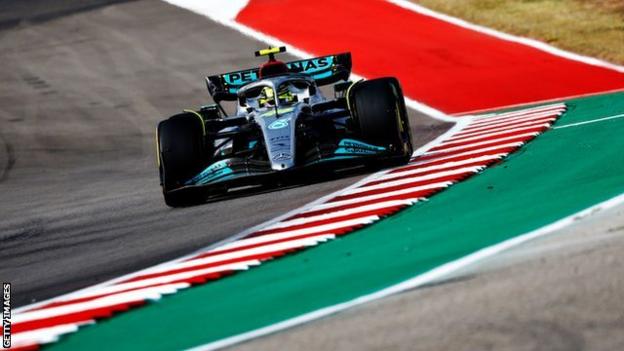
Lewis Hamilton thought he’d buried the ghosts of Abu Dhabi, but they all came rushing back with the revelation that Red Bull broke Formula 1’s budget cap last season.
Losing a record eighth world title after an official freestyled with the rules was “definitely spirit-breaking, or soul-crushing, whatever you want to call it,” Hamilton says, recalling that controversial evening at Yas Marina last December.
So when Hamilton discovered his rivals from 2021, against whom he fought one of the bitterest title battles in F1 history, had exceeded the sport’s brand-new spending limit during that season “that, for sure, brings up a little bit of emotion,” he admits.
“Because you kind of buried it and moved on,” the Mercedes driver adds, “and then it comes back up and it’s like another bit of a kick. And, yeah, that just bought it all kind of fresh again. So then [it was a case of] just getting back into the phase of just suppressing it and moving forwards.”
Hamilton is talking to BBC Sport in a small group interview at the United States Grand Prix. And he is in expansive mood, discussing a range of topics, including Mercedes’ difficult year and his future.
Hamilton has tended to brush off questions about Abu Dhabi and its aftermath this season, preferring to not distract his focus from the immediate task at hand.
But here he is willing to dredge it up again – it is, after all, the context for the most difficult season Hamilton has had in 10 years, in an uncompetitive Mercedes car that he admitted on Sunday looks set to leave him without a win in a season for the first time in his career.
Going into the final laps at Yas Marina last December, Hamilton felt he was just about to complete a remarkable comeback.
After a long, bruising season, dense with controversy, incident and rancour, he had needed to win the final four races to overhaul Red Bull’s Max Verstappen and win the championship.

A spectacular victory in Brazil – perhaps the best of his career – set him on course, and he dominated in Abu Dhabi until a late safety-car period.
Race director Michael Masi, under pressure from Red Bull to get the race restarted, ignored the correct procedure and improvised. Hamilton was left helpless on old tyres against his rival on new, and the title was wrenched from his grasp in one frenetic final lap.
After that, Hamilton disappeared for two months, trying to get his head around what had happened. He was thinking about the sport he loved, whether he could face coming back, and how to find the motivation again when he did.
“Was I ever truly not going to come back?” he says now, thinking about the period with the benefit of nearly a year’s hindsight. “I am not one to give up like that, really.
“What really was breaking was to just believe that the sport would do something like that, that that would happen, given that there are so many people you rely on. You expect that the job would be done right.
“And [that] an outcome of a world championship which so many people have worked so hard for would come out through a wrong decision from somebody, you know?
“That was probably the only thing. It wasn’t for my lack of love for working with my team or racing cars; it was literally that.
“If you can lose a championship through wrongdoing within an organisation, that was the thing that I wondered whether…
“But I spent time with my family and that was really the best part of the healing, really. I just gave all of my time to the kids [his nephews and nieces], building snowmen and just being present with them. That enabled me to really recover, really bounce back. If I wasn’t with them, I would have been stuck in a hole.”
Hamilton says that, even once he had decided he would come back, it was not plain sailing, even before he tried the Mercedes car for first time.
“I would say getting back into training was not easy,” he says. “It’s not like you can just say, ‘OK, right, motivation’s there.’ It definitely took a minute for me to build back in.”
Once he had, the plan was to “come back stronger – and that’s why I came back with fighting mentality. But then we had all the dramas with the car.”
“Dramas” is something of an understatement. Mercedes produced their worst car in 10 years, a design with a fundamental aerodynamic flaw which took three months to solve. Once they had, other problems emerged.
The former champions have made conspicuous progress this year, but the car is still significantly slower than Red Bull and Ferrari, and remains extremely difficult to drive.
Hamilton says trying to take this year’s Mercedes to the limit is “like creeping up behind a horse”.
“You’re trying to get as close as possible,” he says. “What’s the breaking point before it kicks you in the face? And you know it’s going to hurt when it hits your face.
“That’s one of the best ways I can say what it’s like when you’re trying to lean on the car and it’s snapping and unrecoverable. And this car, it’s random.”
Trying to resolve the car’s problems, Hamilton says, has been “gruelling” for everyone at Mercedes.
“We sat in February and we were all upbeat,” he says. “They were all telling us we were gonna have massive quick car.
“And I’m sure everyone who was working on it was so hyped with all the hard work they put in through the winter – it’s such a gruelling time for everyone in the team; that’s when they really crunch and out in the crazy hours.
“To then find out the damn thing doesn’t work, and we’ve got bouncing, that was hard for everybody. Everyone was really struggling, I think.
“And we all went through our own process of how to deal with it. But I think surprisingly it’s been a really powerful transformational time for us all. We’ve got stronger and tighter as a team.”
Hamilton says he suspected it was going to be a long and difficult year immediately.
“I had a feeling when I first drove the car,” he says. “But you can never say never. Maybe we would have fixed it by the first race. Who knows?
“Plus, I’d never had bouncing like that. I didn’t expect the guys to take as long… They didn’t expect it to take as long as it’s taken them to understand what’s causing the bouncing. They’ve had to create new tools, all these things we didn’t have before.
“You just just hold on to hope. And then the next upgrade comes and it doesn’t work, and the next one comes and doesn’t work.
“Imagine people that are building those things and they are seeing performance in the wind tunnel but they are not seeing it on the track. Ah Jesus, you just keep getting knocked back down.
“But what doesn’t kill you makes you stronger and we’re still standing tall. It’s not going to be easy to change the car into a leading car for next year but I think we have a much better understanding of why the car is the way it is.”

The problems with the car, and the complication that the engineers did not know how to fix them, created inaccurate impressions of Hamilton at the start of the season.
He had a handful of difficult races, including some bad luck with the timing of safety cars. His new team-mate George Russell built a lead over him in the championship, and people started to snipe from the sidelines, question whether Hamilton was past it, even whether he should have retired.
The truth was that Hamilton was taking the brunt of experimentation with the car on race weekends.
“Literally, I have tried everything,” he says. “I’ve tried every setting you can possibly do. That’s what I was doing at the beginning of the year.
“The whole idea of performing at your best and getting the best result each weekend; of course that would be nice, but I was really about problem solving: ‘I will sacrifice this session or all the sessions to be able to find more data and information for you.’ So that when we go back to the factory they’ve got a better understanding of what’s going on.’ But it ultimately hindered some of the weekends.”
From about the Canadian Grand Prix in June onwards, Hamilton decided that this approach was not the best, and he began to focus more on performance rather than experimentation. And as he did, the picture began to change.
Russell has had a brilliant season. He is closer to Hamilton on pure performance than any team-mate since Fernando Alonso in 2007, and has very much consolidated his status as one of the brightest stars of the new generation, and a driver more than good enough to lead Mercedes in the future.
But while the average qualifying gap between them over the season is just 0.06secs, if you take only the races from Canada onwards, the margin is 0.175secs.
Hamilton is ahead nine-four on their qualifying head-to-head at races where a fair comparison can be made, and has out-qualified Russell for the last six races in a row. Hamilton, Mercedes engineers say, is better able to cope with the car’s unpredictability.
Russell remains ahead on points, and his season has been more consistent than Hamilton’s, with fewer mistakes. But it is Hamilton who has produced the most competitive Mercedes race drives – in Spain, Silverstone, Hungary, the Netherlands and again at the US Grand Prix last weekend.
The car’s lack of performance has taken any tension out of the drivers’ rivalry, allowed them to build a relationship without the pressures of a title fight, and Hamilton has taken on an almost paternal stance with his team-mate. But it’s clear the competitive desire is still very much alive in him.
“George is doing a great job,” Hamilton says. “I don’t have any problems with it. There’s no issues in the background with us.
“George, I would say, and his team, they don’t experiment the same, obviously. But that’s because I’ve been here for a long time, so I’m willing to take these risks.
“I have the big, deep conversations with people I’ve been with for 10 years. So, me and ‘Shov’ [Andrew Shovlin, Mercedes’ engineering director] can have arguments, constructive arguments.
“George, it’s his first year with the team so he’s come in and he’s just doing his job to the best of his ability. Very little movement of set-up. I’m doing all the leg-work, back and forth here and there, different wings, all these different things. And I like that anyway.
“If we come into next year and we have a car that we are much happier with, then we can be more focused on that whole… not having to go crazy with set-ups. Then we can have a better battle.
“If he finishes ahead at the end of the season, I don’t really feel anything about it. We’re not in the championship. We are fourth and sixth. Now, if it was first and second, it’s different.”

Hamilton’s Mercedes contract expires at the end of next season, and he will turn 39 at the start of 2024. He has previously expressed doubts that he would be racing in F1 at the age of 40. But that now seems an inevitability. And here, for the first time, he says definitively that he will sign a new contract with Mercedes and race on beyond next season.
“We are going to do another deal,” he says. “We’re going to sit down and we’re going to discuss it in these next couple of months, I would say.
“My goal is to continue to be with Mercedes. I’ve been with Mercedes since I was 13. And it really is my family. Mercedes-Benz have stuck with me through thick and thin.
“They stuck with me through being expelled at school. They stuck with me through everything that was going on through 2020 [and his determination to raise issues of diversity and inclusion in F1]. They’ve stuck me through my mistakes and with me through the ups and downs.
“And so I really believe in this brand. I believe in the people that are within the organisation. And I want to be the best team-mate I can be to them, because I think we can make the brand even better, more accessible, even stronger than it is. And I think I can be an integral part of that.
“In terms of my plans for the future… Each year, at the end of the year, you sit there and I’m trying to, like, analyse my year and analyse my next three- to five-year plan. It’s difficult to do 10.
“But where do I see myself? What are the things I want to do? What are my goals? And things are being added. I have a lot of business going on. I have a lot of successful, really positive things that have lots of opportunity for success outside.
“But I want to keep racing. I love what I do. I’ve been doing it for 30 years, and I don’t feel that I should have to stop. I think I’m currently still earning my keep, I would say. I want to do better, still.
“I could stop now and I have lots of other things that I have in the pipeline that I will be super-focused and super-busy.
“I’m here for the sheer love of working in the organisation that I’m in. So, yeah, you’re gonna have to stick with me. You are stuck with me for quite a bit longer.”

